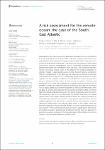A risk assessment for the remote ocean: the case of the South East Atlantic
| dc.contributor.author | Niner, HJ | |
| dc.contributor.author | Rees, SE | |
| dc.contributor.author | La Bianca, G | |
| dc.contributor.author | McQuaid, KA | |
| dc.contributor.author | Howell, KL | |
| dc.date.accessioned | 2024-02-01T13:17:52Z | |
| dc.date.available | 2024-02-01T13:17:52Z | |
| dc.date.issued | 2024 | |
| dc.identifier.issn | 2296-7745 | |
| dc.identifier.issn | 2296-7745 | |
| dc.identifier.other | ARTN 1168686 | |
| dc.identifier.uri | https://pearl.plymouth.ac.uk/handle/10026.1/21991 | |
| dc.description.abstract |
Degradation of the natural world and associated ecosystem services is attributed to a historical failure to include its ‘value’ in decision-making. Uncertainty in the quantification of the relationship between natural capital ‘assets’ that give rise to critical societal benefits and people is one reason for the omission of these values from natural resource management. As this uncertainty increases in marine systems and further still with distance from the coast, the connection between society and natural capital assets is less likely to be included adequately in decision-making. Natural capital assets of Areas Beyond National Jurisdiction (ABNJ), including those of the deep sea, are distant but are known to generate many benefits for society, from the diffuse and broad-scale benefits of climate regulation to the provision of wild fish for food. While our understanding of the precise relationships (the status of asset stocks, ecosystem functions and processes) that control the availability of ecosystem services and the flows of benefits is limited, this does not preclude opening a discourse on how these natural capital assets could best be managed to continue to benefit society. Here we apply a natural capital approach to the South East Atlantic ABNJ, one of the least scientifically understood regions of the planet, and develop a framework for risk assessment. We do this by describing the benefit flows from the natural capital assets of the region, appraising how activities are creating pressures on these flows and whether the controls for these pressures protect them. Our risk register highlights how governance currently favours the protection of direct (extractive) benefit flows from natural capital assets of the region, which are primarily targeted for financial benefit. Without a systems-based framework that can account for the cumulative pressures on natural capital assets their status, associated ecosystem services and benefits are at risk. Such an approach is essential to capture and protect the foundational and often diffuse connections between marine natural capital and global society. | |
| dc.format.extent | 1168686- | |
| dc.publisher | Frontiers Media SA | |
| dc.subject | natural capital | |
| dc.subject | risk register | |
| dc.subject | ecosystem services | |
| dc.subject | ABNJ | |
| dc.subject | ecosystem service governance | |
| dc.subject | deep-sea ecosystem services | |
| dc.subject | societal benefits | |
| dc.subject | ecosystem approach | |
| dc.title | A risk assessment for the remote ocean: the case of the South East Atlantic | |
| dc.type | journal-article | |
| dc.type | Review | |
| plymouth.volume | 10 | |
| plymouth.publication-status | Published online | |
| plymouth.journal | Frontiers in Marine Science | |
| dc.identifier.doi | 10.3389/fmars.2023.1168686 | |
| plymouth.organisational-group | |Plymouth | |
| plymouth.organisational-group | |Plymouth|Research Groups | |
| plymouth.organisational-group | |Plymouth|Faculty of Science and Engineering | |
| plymouth.organisational-group | |Plymouth|Faculty of Science and Engineering|School of Biological and Marine Sciences | |
| plymouth.organisational-group | |Plymouth|Research Groups|Marine Institute | |
| plymouth.organisational-group | |Plymouth|REF 2021 Researchers by UoA | |
| plymouth.organisational-group | |Plymouth|Users by role | |
| plymouth.organisational-group | |Plymouth|Users by role|Academics | |
| plymouth.organisational-group | |Plymouth|Users by role|Post-Graduate Research Students | |
| plymouth.organisational-group | |Plymouth|REF 2021 Researchers by UoA|UoA07 Earth Systems and Environmental Sciences | |
| plymouth.organisational-group | |Plymouth|REF 2021 Researchers by UoA|UoA14 Geography and Environmental Studies | |
| plymouth.organisational-group | |Plymouth|Users by role|Researchers in ResearchFish submission | |
| plymouth.organisational-group | |Plymouth|REF 2028 Researchers by UoA | |
| plymouth.organisational-group | |Plymouth|REF 2028 Researchers by UoA|UoA07 Earth Systems and Environmental Sciences | |
| plymouth.organisational-group | |Plymouth|REF 2028 Researchers by UoA|UoA14 Geography and Environmental Studies | |
| dcterms.dateAccepted | 2023-11-24 | |
| dc.date.updated | 2024-02-01T13:17:51Z | |
| dc.rights.embargodate | 2024-2-2 | |
| dc.identifier.eissn | 2296-7745 | |
| dc.rights.embargoperiod | ||
| rioxxterms.versionofrecord | 10.3389/fmars.2023.1168686 |


